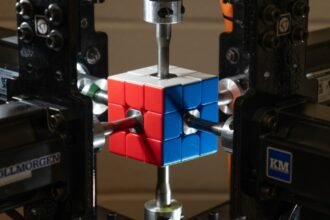The latest season of Doctor Who kicks off as it often does, with an unsuspecting human encountering bizarre alien phenomena that only make sense when an unusual yet charming Time Lord arrives in a police box to save the day. The premiere episode, titled "The Robot Revolution," has a classic Doctor Who feel, as it sees the Doctor and his new companion facing an army of lethal machines from another world.
Throughout its 61-year history, Doctor Who has regularly seen the Doctor combatting various quirky automatons. However, what distinguishes "The Robot Revolution" is its commentary on the origins and ideology of these particular robots. Showrunner Russell T. Davies explained that in 2025, artificial intelligence-driven machines are exactly the kind of adversaries the Doctor should combat, as Doctor Who has always used fiction to reflect on real-world issues.
"Doctor Who always addresses the modern world," Davies remarked on AI’s growing presence. "The Doctor has always battled robots, but now, when you include a robot in the show, you can’t avoid discussing ‘artificial intelligence.’ It’s just impossible."
The robots menacing Belinda Chandra, played by Varada Sethu, initially don’t seem much different from the mechanical foes the Doctor, portrayed by Ncuti Gatwa, has faced before. Like the Daleks and the Cybermen, the machines in "The Robot Revolution" are focused on achieving their goals with no regard for human lives. This determination enables them to conquer a planet of organic beings—a planet named "Missbelindachandra-1" due to a peculiar incident involving Belinda’s ex-boyfriend Al, who owns the rights to name a distant star.
At first, these robots appear to be mere tools for suppressing a rebellion. However, the episode twists towards the end, revealing that the machines follow orders from Al himself. Al, now a human-machine hybrid, is obsessed with merging with Belinda, believing he has the right to do so.
The episode critiques existing AI and incel culture, emphasizing that these robots’ villainy is tied to the narcissistic and misogynistic traits of their human creator, Al. Belinda even refers to Missbelindachandra-1 as "the planet of the incels," highlighting the connection between the episode’s themes and real-world concerns about AI and radical ideologies.
Davies aimed to delve into these societal issues rather than portray AI as inherently evil. He intended to show how the darker sides of technology often stem from human shortcomings. "Everything I write incorporates modern elements because that’s the core purpose of science fiction," Davies said. "If you examine AI developers’ nature, you quickly arrive at the revelations Belinda encounters on Missbelindachandra-1."
Although the Doctor and Belinda triumph in "The Robot Revolution," Davies noted that the series would continue its incisive social commentary in future episodes. An upcoming adventure takes the duo to 1952 Miami, where they confront the period’s racial segregation, shedding light on America’s history and its ongoing issues.
"What Belinda hasn’t considered, especially as a British woman, are the era’s segregation laws," Davies explained. "While Britain faces its challenges, we never had segregation laws like those in the US in 1952. This transforms into a compelling story that remains classic Doctor Who while featuring a monstrous entity."









